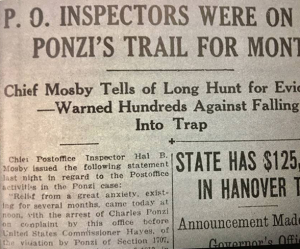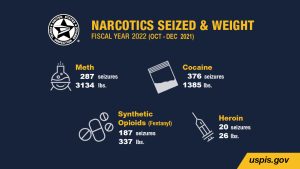Read “Postal Inspectors: Law Enforcement Agents” here.
The United States Post Office has been around since the days of Benjamin Franklin, quietly doing a great job of delivering more mail to millions of U.S. residents than any other company, six days a week and sometimes Sundays. No other delivery company handles the volume of mail on a daily basis as the United States Postal Service. Sadly, we only hear about the USPS when something awful happens, and when nasty people take advantage of the efficient system already in place to carry out their nefarious plans.
Interestingly enough, the USPS can help work on postal treaties with other countries, so the rising cost of postage we have to put on packages to Canada or Europe etc., has been negotiated as part of certain economic trade packages.
But there is a branch of the USPS that works as a law enforcement arm: the United States Postal Inspection Service. They have special agents who are licensed to carry firearms, make arrests, and investigate suspected crime, as well as auditors who uncover fraud that targets Post Office services.
Benjamin Franklin was concerned about the rise in theft by the mail riders themselves, or others entrusted with safekeeping of the mail and its delivery, and in 1792, stealing the mail was considered so serious that the death penalty was imposed by Congress.
By the 1850s, more people headed west as the country rapidly expanded, and trains and stagecoaches were commonly used as a means to improve mail delivery throughout even the most remote territories. That move away from the one-rider-one-horse model to the speed that the train and the stagecoach provided, also created an explosion of train and stagecoach robberies. The Wild West had become a profitable place for bands of outlaws led by men like Billy the Kid, Butch Cassidy, and the Sundance Kid. In response, the USPIS (the United States Postal Inspection Service) grew in size and experience in order to investigate, arrest, and convict the culprits responsible for the theft of thousands of dollars in mail bags and gold.
As the railroad companies improved security and postal inspectors were issued Thompson submachine guns in the 1920s, train robberies dropped, but criminals like the “Black Hand” and Charles Ponzi found other ways to take advantage of and sabotage the mails.
The “Black Hand” threatened people with bodily harm via letters if they didn’t come up with cash. Charles Ponzi, the creator of the pyramid scheme, swindled would-be postal coupon investors by promising to double their money in three months time. Even some Boston investigators sent to check out the wild interest in Ponzi’s company fell for his savvy pitch and invested their hard-earned money. In reality, all he did was collect big bucks from people, then get new ‘investors’ to hand over their cash, which Ponzi gave to the old investors as return on their investments – which meant that he was always upside down financially. By the time he was convicted, he had $110 million on hand, but owed $200 million to the investors. The people that cashed out early were fortunate. The people last in line lost everything.
The USPIS has broken up art fraud rings, helped capture Ted Kaczynski (the Unabomber), and partnered with the FBI to investigate the mailing of the four deadly Anthrax letters sent in 2001.
Be reassured that after the spate of bomb deliveries to unsuspecting customers, dogs have been employed, along with other explosive detection devices, to sniff out the deadly packages before they ever leave the postal delivery hubs.
The USPIS website mentioned examples of fraud they have uncovered, including a trucking contractor defrauding the Postal Service of $1.5 million in fuel rebates; a highway route contractor defrauding the Postal Service of $120,468 for services not rendered; and a construction contractor charging the Postal Service $175,630 for work never done. Shaking my head at the stupidity of people thinking they could get way with not paying the taxes and fees.
The USPIS investigates and prosecutes cases of:
- Consumer fraud (including sports memorabilia – game jerseys not worn by the star)
- Counterfeit money orders and stamps
- Misrepresentation of items sold through the mail
- Money laundering
- Cybercrimes (committed online, generally using computers or handheld devices, almost always involving the postal system. The criminal commits identity theft, gathers financial and other information, then uses that information to contact unsuspecting targets through emails to pitch large $$ scams.)
Drugs thru the mail:
Pharmacies have delivered prescriptions to law-abiding citizens for decades, but they are not the only ones using the system. Drug cartels have discovered how well the USPS operates, so the USPIS works with US Customs and Border Protection, and other federal agencies to stop the almost epidemic cases of opioid mail delivery.
The Postal Inspectors have employed time honored methods to catch the bad guys:
- Collect the evidence
- Identify the suspects
- Work with the National Forensic Lab to develop a fact pattern that they can take to a U.S. Attorney
There are hundreds of cases that have been investigated and solved with the involvement of the United States Postal Inspection Service. Please check out www.uspis.gov for some great information about how the Post Office helps you every day. If you’re interested in the training the Postal Inspectors undergo, or how to become one, check them out.
*Photos and logo courtesy of the USPIS.


